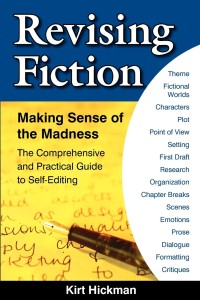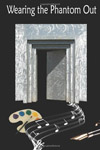by Kirt Hickman
 No matter what kind of writing you do, your narrative style must be taut, clear, and engaging. If you write fiction, it must also contain tension and emotion. Unnecessary words and phrases will clutter your narrative. They will sap the strength, even the very life, out of your writing. The following tips will help you eliminate the unnecessary clutter.
No matter what kind of writing you do, your narrative style must be taut, clear, and engaging. If you write fiction, it must also contain tension and emotion. Unnecessary words and phrases will clutter your narrative. They will sap the strength, even the very life, out of your writing. The following tips will help you eliminate the unnecessary clutter.
1. Eliminate Filter Words
Filter words, also called viewpoint intruders, are words like saw, felt, heard, watched, etc., that take the reader out of the character’s point of view. Consider this example from a critique submission. “I” refers to a woman named Clara.
I looked around at my fellow passengers. I overheard snatches of conversation in Italian. I saw parents feeding snacks to children, even a breastfeeding mother.Here, the reader isn’t looking at passengers, overhearing conversations, or seeing parents feed children. The reader watches Clara as Clara looks at, overhears, and sees the action of the scene. These words have become a filter between Clara and the reader.
The author can eliminate the first sentence because Clara doesn’t see herself looking around. The rest of the passage can be written without filter words:
All around me, people spoke in Italian. Parents fed snacks to their children. One woman nursed her infant.2. Eliminate Thinker Attributives
A thinker attributive uses phrases like he thought, or knew, or remembered to show what your character is thinking. Don’t rely on these devices. You’re writing from the character’s point of view; therefore, any thoughts you express are assumed to be the thoughts of the character. This makes thinker attributives unnecessary. Look at the following example from a critique submission:
Luke believed that his dad knew most everything that went on in Willacy County but he wasn’t sure he knew about the sugarcane fields.Now, without the thinker attributives:
Luke’s dad knew most everything that went on in Willacy County, except maybe about the sugarcane fields.Because the passage is written from Luke’s viewpoint, these are clearly Luke’s thoughts, though he might be wrong about what his father knows or doesn’t know.
3. Minimize Use of “Not” and “n’t”
Readers want to know what something is. They’ll be dissatisfied if you tell them only what things are not. Therefore, not interesting, becomes uninteresting, boring, dull, or plain; perhaps even uninspired, bland, or tedious, depending on the context. Generally speaking, eliminating not results in tighter, more precise wording.
4. Eliminate Unnecessary Use of “That”
The word that is often used unnecessarily. Consider the following example, excerpted from a letter my hero wrote in my own science fiction novel, Worlds Asunder:
I’m writing to let you know that my homecoming will be delayed. I know that you and the girls were looking forward to seeing me, but a case has come up that will delay my departure.Wherever you see the word
that, delete it and read the sentence without it. If the sentence makes sense, omit the word
that. In this example, only the third occurrence of
that is necessary.
5. Eliminate Repeated Elements
Repeated elements are aspects of your story, particularly an emotion or bit of characterization, that you’ve shown in more than one way. Repeated elements weaken your writing. This example from a fight scene in Worlds Asunder contains two repeated elements:
The whole apartment seemed to be swirling. Nothing was clear and everything was moving. Where is he? Chase heard a sound to his left and spun his head. For a moment, his vision went black, the swift movement nearly causing him to lose consciousness.This revision eliminates the repeats:
The whole apartment seemed to be swirling. Chase heard a sound to the left and spun his head. For a moment, his vision went black and the pain in his skull soared.At best, repeated elements give a feel of wordiness to your narrative. At worst, they condescend to the reader. Have confidence in your ability to show. Show things once and show them well. Your reader will get the point.
6. Eliminate Adverbs
In general, delete your adverbs. Adverbs tend to signify lazy writing. The author uses a descriptor to avoid finding the right verb. I once heard a writer recommend deleting all adverbs from a manuscript and reading it without them, then putting back only those that are absolutely necessary. I would add: For those that remain, strengthen the verb rather than reinsert the adverb. For example, stared grumpily might become glared, glowered, scowled, or frowned.
7. Eliminate Repeated Words
The following passage from an early draft of Worlds Asunder takes place immediately after a lunar building explodes. A construction worker drives his oversized bulldozer up a damaged truck ramp and spots two wounded survivors trapped on a damaged framework of trusses above him:
He depressurized his compartment and climbed out. He found the distance that he had to jump to be greater than he’d expected. He heard the men above him now, coming in loud and clear on his comm system, urging him to hurry. He looked up and saw their catwalk swaying and beginning to sag under their weight.
Every sentence in this passage starts with he. This draws the reader’s attention away from the story and onto the text. Restructure your sentences to avoid repeated beginnings. Include more sensory details. Show your viewpoint character’s emotions. The following revision doesn’t have a single sentence that begins with he:
Once in place, he depressurized the compartment and climbed out. His heart sank when he saw the distance he’d have to jump.
The men called to him through the comm, urging him to hurry. Suddenly, a support buckled and the whole catwalk began to give under their weight.
Similarly, don’t repeat the same uncommon word, or forms of the same word, within a short span of text. Consider the following example excerpted from a critique submission:
Jamie, Leah, Camille, and Lawrence passed the platter around, fast and deliberate, like a quarterback passing off a football.
Substitute synonyms to avoid repeating words.
Jamie, Leah, Camille, and Lawrence passed the platter around, fast and deliberate, like a quarterback handing off a football.
8. Eliminate Excess Adjectives
Don’t string a bunch of adjectives together to describe a single noun:
. . . a hot, dry, sunny, summer day.
The use of multiple adjectives gives the reader too much information to catalogue, especially if you do it often. If you must use an adjective, limit yourself to one per noun. Pick the one that describes the characteristic most important to the viewpoint character. For example, a construction worker laboring outside would probably describe the day as hot. A farmer, concerned about another year of drought, would characterize the day as dry.
9. Eliminate Unnecessary Prepositional Phrases
Chase stood among the clues in the cockpit and let them tell their story.
If the reader already knows Chase is in the cockpit, write this as:
Chase stood among the clues and let them tell their story.
Challenge each prepositional phrase in your manuscript. If it doesn’t say something that’s both new and necessary, delete it.
10. Don’t Put Questions in Your Character’s Thoughts
Minimize the number of questions that appear in your character’s thoughts. Similar to telling, questions in a character’s thoughts do your reader’s work for her. They tell her what to wonder. Let the reader come up with her own questions.
Consider the following passage from a critique submission, in which Luke has ventured into a sugarcane field that has always frightened him. There, he meets a boy named Antonio.
The dark-haired Mexican kid was standing with a finger over his lips. Luke frowned and opened his mouth. The boy shook his head and made a waving motion.
He wants me to go away? That’s what I’m trying to do. Why did he stop me? Luke studied Antonio. He’s trying to hide something. But what? Himself? This kid is confused, Luke thought. Antonio must be an illegal. What else could he be hiding?
The last paragraph puts direct questions into Luke’s thoughts. There’s almost always a more effective way to show what questions your character faces than to pose them so blatantly:
The dark-haired Mexican kid stood with a finger over his lips. Luke frowned and opened his mouth. The boy shook his head and made a waving motion to shoo Luke away.
All Luke wanted to do was run, to get as far from this creepy cane field as possible by the time the dying sun faded from the horizon. Yet he studied Antonio. Nobody would enter the sugarcane, especially at night, unless he was hiding something. He must be an illegal.
The reader still knows what questions Luke has. Now, however, the reasons for them are clear as well.
In summary, minimize your use of these ten grammatical devices. Doing so will increase the pace of your narrative and the tension in your story.
 Kirt Hickman is a technical writer turned fiction author. His books include three sci-fi thriller novels Worlds Asunder (2008), Venus Rain (2010) and Mercury Sun (2014), the high fantasy novel Fabler’s Legend (2011), and the writers’ how-to Revising Fiction: Making Sense of the Madness (2009). This post combines the first two articles in his two-year column, “Revising Fiction,” originally published in SouthWest Sage, and reprinted here by permission.
Kirt Hickman is a technical writer turned fiction author. His books include three sci-fi thriller novels Worlds Asunder (2008), Venus Rain (2010) and Mercury Sun (2014), the high fantasy novel Fabler’s Legend (2011), and the writers’ how-to Revising Fiction: Making Sense of the Madness (2009). This post combines the first two articles in his two-year column, “Revising Fiction,” originally published in SouthWest Sage, and reprinted here by permission.
![]() Sentence parts that do not fit together grammatically or logically result in a mixed construction. Although readers will see and hear the logical error first, the cause of the error is often mechanical. Writers force parts of speech to take on grammatical functions for which they are not designed. The example below shows both errors.
Sentence parts that do not fit together grammatically or logically result in a mixed construction. Although readers will see and hear the logical error first, the cause of the error is often mechanical. Writers force parts of speech to take on grammatical functions for which they are not designed. The example below shows both errors. Her poetry publications include Wearing the Phantom Out (2013) and Rumi’s Falcon from Neuma Books. Individual poems have appeared in Malpais Review, Adobe Walls, ContraACultura (online), Parnassus, Sinister Wisdom, Latuca, The Rag, and The Burning Bush. Her work has also been anthologized in Centos: A Collage of Poems and Hey Pasean!
Her poetry publications include Wearing the Phantom Out (2013) and Rumi’s Falcon from Neuma Books. Individual poems have appeared in Malpais Review, Adobe Walls, ContraACultura (online), Parnassus, Sinister Wisdom, Latuca, The Rag, and The Burning Bush. Her work has also been anthologized in Centos: A Collage of Poems and Hey Pasean!



